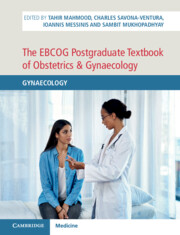Book contents
- The EBCOG Postgraduate Textbook of Obstetrics & Gynaecology
- The EBCOG Postgraduate Textbook of Obstetrics & Gynaecology
- Copyright page
- Dedication
- Contents
- Videos
- Contributors
- Preface
- Section 1 Basic Sciences in Gynaecology
- Section 2 Menstrual Disorders
- Section 3 Reproductive Endocrinology and Infertility
- Section 4 Contraception and STIs
- Section 5 Post-Reproductive Care
- Section 6 Vulva and Vagina
- Section 7 Cervix
- Section 8 Uterus
- Section 9 Ovary and Fallopian Tubes
- Section 10 Operative Gynaecology
- Section 11 Public Health Issues in Gynaecology
- Chapter 51 Clinical Governance in Gynaecology
- Chapter 52 Prevention of Unintended Pregnancy
- Chapter 53 HPV Immunization
- Chapter 54 Screening for Gynaecological Cancers
- Chapter 55 Female Genital Mutilation/Cutting
- Chapter 56 Genetics and Gynaecological Disease
- Chapter 57 Legal and Ethical Issues in Gynaecological Practice
- Section 12 Miscellaneous
- Index
- Plate Section (PDF Only)
- References
Chapter 56 - Genetics and Gynaecological Disease
from Section 11 - Public Health Issues in Gynaecology
Published online by Cambridge University Press: 24 November 2021
- The EBCOG Postgraduate Textbook of Obstetrics & Gynaecology
- The EBCOG Postgraduate Textbook of Obstetrics & Gynaecology
- Copyright page
- Dedication
- Contents
- Videos
- Contributors
- Preface
- Section 1 Basic Sciences in Gynaecology
- Section 2 Menstrual Disorders
- Section 3 Reproductive Endocrinology and Infertility
- Section 4 Contraception and STIs
- Section 5 Post-Reproductive Care
- Section 6 Vulva and Vagina
- Section 7 Cervix
- Section 8 Uterus
- Section 9 Ovary and Fallopian Tubes
- Section 10 Operative Gynaecology
- Section 11 Public Health Issues in Gynaecology
- Chapter 51 Clinical Governance in Gynaecology
- Chapter 52 Prevention of Unintended Pregnancy
- Chapter 53 HPV Immunization
- Chapter 54 Screening for Gynaecological Cancers
- Chapter 55 Female Genital Mutilation/Cutting
- Chapter 56 Genetics and Gynaecological Disease
- Chapter 57 Legal and Ethical Issues in Gynaecological Practice
- Section 12 Miscellaneous
- Index
- Plate Section (PDF Only)
- References
Summary
The large number of gene–disease associations that have been discovered through the use of high-throughput genomics have revolutionized our understanding of complex disease biology. Genomics holds ample scope from the clinical perspective, particularly with regards to disease risk prediction, improving disease classification, risk stratification and drug selection. Elucidating the functional impact of genomic variants is a critical challenge that should further facilitate the ‘bench to bedside’ translation. Additionally, healthcare systems need to acknowledge the necessity of updating and adapting current practices to ensure direct and cost-effective translation of modern genomics to the clinic.
Keywords
- Type
- Chapter
- Information
- The EBCOG Postgraduate Textbook of Obstetrics & GynaecologyGynaecology, pp. 483 - 490Publisher: Cambridge University PressPrint publication year: 2021

